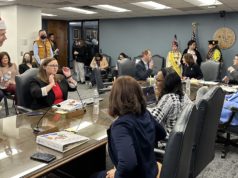

(Update: On Tuesday, June 28, Joy Hofmeister won the Democratic gubernatorial primary.)
Oklahoma’s Democratic voters face a stark choice in their upcoming gubernatorial primary as they decide whether to cast a ballot for State Superintendent of Public Education Joy Hofmeister, a newly minted Democrat who bills herself as “aggressively moderate,” or former Sen. Connie Johnson, a longtime party member with a history of championing progressive causes.
Johnson was among the first Oklahomans to declare a candidacy in any 2022 race, registering with the Ethics Commission in May 2021. After months of rumors, Hofmeister joined the race in October, changing her voter registration from Republican to Democrat just before the statutory deadline.
Johnson questioned the authenticity of Hofmeister’s last-minute party change.
“In my opinion, a person who will flip one way will flop back the other, and I don’t trust a person who does that just for personal gain,” Johnson said.
Hofmeister, however, said she is “working hard” to earn Democrats’ votes and is confident that her path to the governor’s mansion offers Oklahomans an alternative to incumbent Gov. Kevin Stitt, whom she said has “hijacked the Republican Party.”
“Let’s put it this way: I’m independent in holding both parties accountable,” she said. “But I also am a fighter, and I can’t help but stand up and fight for the future of our children, of all of those who are in communities across this state who are counting on a leader who will work to bring people together to get things done.”
In interviews with NonDoc, Johnson and Hofmeister discussed their political track records, their top policy priorities and the first actions they would take if elected governor.
The winner of the Democratic primary will face the GOP nominee, independent former Sen. Ervin Yen and Libertarian candidate Natalie Bruno in the November general election.
Paths to the gubernatorial race

Hofmeister became state superintendent of public education in 2014, ousting the incumbent, Janet Barresi, in the Republican primary. Before that, Hofmeister worked as a public school teacher and spent 15 years running Kumon centers in Tulsa. She served on the State Board of Education from 2012 to 2013 as an appointee of Gov. Mary Fallin.
In 2016, Hofmeister faced criminal charges related to alleged campaign finance violations, but the charges were dropped several months later. Communications among people involved in her campaign revealed allegedly improper coordination with the creation of and funding of an independent expenditure committee that ran advertisements against Barresi.
Hofmeister’s background in education is a central theme of her gubernatorial campaign, and she often talks about her own difficulties as a student.
“I was that kid who struggled with dyslexia. It runs in my family. I get what it’s like to struggle to read and to overcome that and how that impacts your life,” she said. “I was the first in my family to go to college, and I dropped out of college. (…) There are struggles that regular, ordinary Oklahomans face, and we need a governor who has lived that and overcome challenges and is a fighter that can bring people together for real, meaningful progress for Oklahoma families.”
Hofmeister has publicly criticized Stitt’s administration over issues such as the handling of the COVID pandemic in schools, and Stitt has ordered an audit of the State Department of Education, which Hofmeister heads. Much of Hofmeister’s campaign rhetoric is focused on Stitt, whom she says engages in “self-dealing” and has lost the trust of voters.
“Gov. Stitt is running our state into the ground, and everyone that I assume is running for governor is focused on removing him for his failed leadership,” Hofmeister said when asked about her decision to run. “I’ve had a front-row seat to his pandering to extremism.”
To face Stitt, however, Hofmeister must first take on Johnson.
Johnson worked as a legislative assistant in the Oklahoma Capitol for more than 20 years before being elected to the Senate in 2005 to represent SD 48, on the east side of Oklahoma City. She held the seat until 2014. During her time in the Legislature, she said she proposed several measures that, although they failed, ultimately “moved the needle” on important issues. Johnson proposed legalizing marijuana more than 10 years before the state’s medical marijuana program passed via a state question in 2018. She also focused on criminal justice reforms, such as reducing penalties for nonviolent drug offenses. That also ultimately passed by a state question.
“I just think I have a finger on the pulse of the people,” Johnson said, “and the gift of vision, you know, shored up with experience — and experience, and experience — that support me, that qualify me, that inspire me, that give me the fortitude to believe that I can still make a difference.”
The “pillars” of Johnson’s campaign include education, infrastructure, health care, criminal justice reform, families’ wellbeing and the economy. Under these categories fall policies such as sentencing reform, raising the minimum wage and making child care affordable.
“Ultimately, our focus is to focus on the least, the last, the lost, the left out, the marginalized communities,” Johnson said. “These groups are always being left behind and, subsequently, it is costing us as citizens, versus our looking at their issues head-on and starting the process to develop solutions.”
Policy particulars

Ask Johnson about the policies she would like to see enacted as governor, and she’ll pepper you with a long list of changes she believes Oklahoma needs, from increasing the availability of mental health counseling to ending the death penalty and making junior college available for free.
Johnson said her first actions in office would be to “discontinue the efforts to suppress the vote,” reorganize the education system “to be accountable to the best interests of the child” and use federal money to create jobs via infrastructure projects throughout the state.
A policy she is particularly excited about, however, is expanding the industrial hemp industry. She calls herself the “queen mother of the movement” to bring legal cannabis to Oklahoma, and she says expanding the industry would help pay for her policy initiatives.
“Oklahoma is suited, perfectly suited — topography-wise, soil, climate — for growing hemp,” she said. “Hemp grows here, cannabis grows here, between the cracks of the concrete. We led the nation in rope production in World War II because of how it grows here. This is an industry that we’ve only scratched the surface of, but thousands of products can be created from hemp. Rural Oklahoma can be revitalized with hemp. (…) We deserve to occupy our space in the center of America and to be an economic powerhouse just based on what God has put here for the people of Oklahoma.”
When Hofmeister talks policy, she presents a holistic vision for improving the state’s education, health care and economy.
“There are so many areas that impact Oklahomans,” she said, “and when we think about the fundamental foundation of having a strong, robust economy, it starts with education, and it starts also with having access to quality, affordable health care and healthy communities. Our workforce development, businesses don’t have the workers they need. All of this is a part of a collective impact of not addressing the fundamental priorities that make for a robust economy. Our governor has said he wants to be Top 10, but he has demonstrated he doesn’t know how to get there.”
As governor, Hofmeister said her first actions would be targeted at education and health care.
“First thing we would do is to shore up education with a bold investment to solve our teacher shortage,” she said. “Second would be to work to ensure that our rural hospitals (and) nursing homes are not at risk for closure with the governor’s efforts to privatize Medicaid expansion with managed care. And it is certainly important to have better-paying jobs and workforce development. The governor is out of touch with regular Oklahoma families, and businesses — small businesses — that are suffering with inflation, that are suffering with gas prices, that are suffering with high costs at the grocery store, and we need a governor who will do something, not just talk about it.”
Running blue in a red state
Regardless of who wins the primary, the Democratic candidate will face an uphill battle in a state where the Legislature is overwhelmingly Republican and no Democrat has won a statewide race in more than a decade.
Hofmeister and Johnson both named a few issues where they believe Stitt is vulnerable, including recent abortion regulations, tensions with Oklahoma’s tribal nations, and perceptions of corruption and insufficient transparency. And both said they believe Oklahomans want to avoid “extremism.”
Hofmeister said she believes she can win as a Democrat by appealing to moderation and unity.
“Our state needs balance,” she said. “I think Oklahomans are craving balance. They are tired of the extremism, and a governor that can provide that balance and can set a vision can lead this state with unity and get it done, and get the job done that Oklahomans deserve.”
Johnson, meanwhile, thinks that voters will see beyond party labels and focus on the issues.
“I believe if you define me being a Democrat as certain values and whatever, I think our chance lies in the fact that the issues that I champion are not about a party, they are about the people,” she said. “There’s enough disillusionment in both parties — with the Democrats and the Republicans, the extremists — and I represent that entity that gets it, about the things that affect all of us, regardless of the party.




















